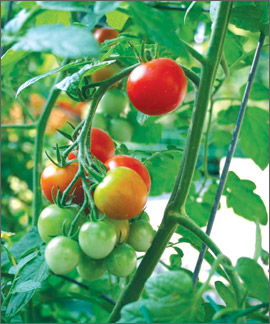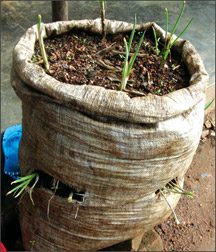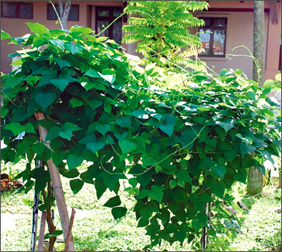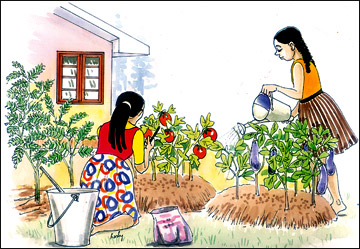|

Back to the good earth:
You are what you grow
Aditha Dissanayake
Could it be that the new year has found you in a bad mood? Especially
when it comes to the increasing prices of food items. Especially when
the prices of vegetables seem to have risen even more every time you go
to the supermarket or the Sunday fair. Especially when you see one kilo
of onions costs Rs 500. Isn’t it time you did something about it?
  The
way Michelle Obama did when she came to live in the White House; the way
Queen Elizabeth II did after she met Michelle Obama. The way ‘posh
ladies’ did, according to a recents editorial, during the ‘grow more
food’ campaign of Prime Minister Dudley Senanayake. The way Renton de
Alwis is doing in Kiula, the way Chef Pubilis Silva is doing in Colombo. The
way Michelle Obama did when she came to live in the White House; the way
Queen Elizabeth II did after she met Michelle Obama. The way ‘posh
ladies’ did, according to a recents editorial, during the ‘grow more
food’ campaign of Prime Minister Dudley Senanayake. The way Renton de
Alwis is doing in Kiula, the way Chef Pubilis Silva is doing in Colombo.
According to reports in the New York Times, Michelle Obama started
digging up a patch of the South Lawn to plant a vegetable garden, no
sooner than she stepped into her new abode in January 2009. Though the
Clintons had grown a few vegetables in pots on the White House roof
before her, this is the first proper vegetable garden at the White House
since Eleanor Roosevelt’s victory garden in World War II. And what do
you find growing in it? Almost anything except beets (because President
Obama does not like them). Possibly taking the cue from the First Lady,
the Queen too joined the ‘grow your own’ revolution after she met
Michelle Obama and, according to The Telegraph created a vegetable plot
at Buckingham Palace. Her garden is said to contain beans, onions,
leeks, carrots and an endangered variety of climbing French beans called
“Blue Queen”.
Closer to home, Chef Pubilis too grows his own vegetables, though not
in a garden, but in pots (pochchi is the word he uses to describe them).
He believes every household should have one tree of karapinchha, one
plant of green chilly and one bush of rampe. He is confident one need
not go hungry if one is daring enough to step beyond the conventional
list of vegetables one sees at the market to prepare a balanced meal.
“There are only about fifty vegetables in the market; carrots, leeks,
knol khol, cabbages, capsicums etc. But there are more than two hundred
edible plants in our country,” reminds Chef Pubilis. If we can enlighten
everyone about these edible plants he believes the present crisis could
be solved. “Why do we buy expensive, poisonous wild plants from plant
exhibitions, bring them home, nurture them with water and fertilizer
when we can easily spend less money, time and effort to grow a few
vegetables?” he questions and suggests plants like brinjals, ladies
fingers, and beans will provide the same kind of beauty one wishes to
find in an inedible ornamental plant. His final words though is a
reprimand to the over excessive lifestyles of the present generation.
“Don’t live to eat. Eat to live.”
  But
to eat, even if only to live, you need to find a way to overcome the
exorbitant prices of vegetables for sale at the market. “Learn how to
grow some or most of your own food,” advises Chandrani Abeygunasekara,
Programing Assistant (Agriculture) at the Horticultural Crop Research
Development Institute, Gannoruwa. “This is not as complicated as you
might think. If you have access to a patch of ground no larger than a
flower bed or if you have a few polythene bags (the kind rice is stored
in), you can grow enough vegetables to feed your family,” says
Abeygunasekara. But
to eat, even if only to live, you need to find a way to overcome the
exorbitant prices of vegetables for sale at the market. “Learn how to
grow some or most of your own food,” advises Chandrani Abeygunasekara,
Programing Assistant (Agriculture) at the Horticultural Crop Research
Development Institute, Gannoruwa. “This is not as complicated as you
might think. If you have access to a patch of ground no larger than a
flower bed or if you have a few polythene bags (the kind rice is stored
in), you can grow enough vegetables to feed your family,” says
Abeygunasekara.
Before you begin your garden though, she suggests you pay a visit to
the home garden maintained by her institute. Though it is in Gannoruwa
she feels it might be worth a visit as you are bound to receive
instructions on everything you need to do to create a vegetable garden
in your own backyard, as well as what types of vegetables and fruits you
can grow. “Brinjals, chillies, tomatoes and leafy vegetables like
gotukola can easily be grown even in pots,” says Abeygunasekara. “Even
if you have never planted anything in your life, it’s never too late to
start.”
For the more adventurous, Agriculture Department Assistant Director
Dr Rohan Wijekoon has another suggestion: “Create an edible landscape.”
Instead of restricting the vegetable patch to the backyard, where it
is out of sight, vegetables can be grown in the front garden in
attractive ways. An edible garden will not only please you but feed you
and still be a home for all the others who come to pay a visit, from
caterpillars to butterflies to your grandchildren.
“A variety of colourful vegetables can be used to create a beautiful
garden,” says Dr Wijekoon. “Pathola and watakolu can be used for arches.
Hedges can be made of gotukola, kankung, mukunuwanna and different
varieties of sweet potatoes.”
Time to close your eyes and visualize going out into your garden, (or
to the pots on the porch or to the bags of polythene on the balcony), to
pick two or three different kinds of vegetables for the mid day meal.
Now shouldn’t you get onto your feet, step outside and start digging? A
little fuss.
A little mud. Unlimited patience. And you have it all.
No act can be more gratifying, and more basic than the bond you
create between yourself and Mother Earth as you till the soil, plant the
seeds, watch the leaves unfurl, and finally bring home to the kitchen
table, a handful of tomatoes.
Do it just to know that you can do it, or to save money, or to keep
your family safe from weedicides and pesticides. Or do it, just to live.
[email protected]
Towards a disciplined nation
Lionel Wijesiri
The extent of gross indiscipline in our country is so widespread that
it has become a thorny issue of which both the ruling and the ruled are
culpable. This is also true among both the educated and the uneducated.
Today, people flout rules and regulations with impunity: we litter the
streets, dump refuse indiscriminately, park our cars at unauthorized
places, erect structures anywhere we please, trade at undesignated
places all under the pretext of ignorance.
Undoubtedly, the entire Sri Lankan society is heavily diseased with
the maggots of indiscipline. Most of us are behaving as if we care less
where Sri Lanka ends. Some drivers, policemen, students, traders,
workers, contractors, business bosses, and politicians - everybody is
just out of control. Lamentably, we fail to appreciate that the various
evils that we face today are the direct and indirect cost of our
undignified demeanour in our society.
 The
other day I was in our local Super Market and a little boy wanted his
mother to buy him something because a favourite cartoon character was on
the box. It was obvious that the lady didn’t have the money to get
everything she needed, much less the kid’s item. She said ‘no’ and tried
to go on about her business. The kid wasn’t going to give up so easily.
He began the begging routine, trying to wear her down. When that didn’t
bring about the desired result, little ‘terror’ began doing the fit
throwing thing. The little lady didn’t have a clue I was inwardly hoping
she’d put her foot down and take control, instead of allowing the kid to
rule the roost. (I’m sure I wasn’t the only one in the store feeling
that way.) But no, she gave in, and rewarded the kid for his
unacceptable behaviour... reinforcing his belief that if he just gets
loud enough and angry enough and obnoxious enough... he will always get
what he wants in life. What a wonderful man he’ll turn out to be, one
day! The
other day I was in our local Super Market and a little boy wanted his
mother to buy him something because a favourite cartoon character was on
the box. It was obvious that the lady didn’t have the money to get
everything she needed, much less the kid’s item. She said ‘no’ and tried
to go on about her business. The kid wasn’t going to give up so easily.
He began the begging routine, trying to wear her down. When that didn’t
bring about the desired result, little ‘terror’ began doing the fit
throwing thing. The little lady didn’t have a clue I was inwardly hoping
she’d put her foot down and take control, instead of allowing the kid to
rule the roost. (I’m sure I wasn’t the only one in the store feeling
that way.) But no, she gave in, and rewarded the kid for his
unacceptable behaviour... reinforcing his belief that if he just gets
loud enough and angry enough and obnoxious enough... he will always get
what he wants in life. What a wonderful man he’ll turn out to be, one
day!
Mode of life
Most of us seem to think that without any discipline whatsoever, we
can become what we want to be, our children will turn out wonderful, our
horses will automatically handle like we want them to, and our nation
will always be strong. Wrong! It would not happen that way. Nothing good
comes into being without discipline. Leave discipline out, and sooner or
later, it erodes into total chaos and disorder. Whether it’s a home,
school, a business... or a nation; without discipline, the quality of
life quickly deteriorates. Discipline means a mode of life in accordance
with rules. It, however, does not mean the negation of personal liberty.
Discipline means to subject oneself to control. In a democratic country
like Sri Lanka, progress can only be achieved if there is discipline
among the citizens. In order to maintain law and order in the country,
the Government makes laws. This is to make the citizens disciplined and
to maintain harmony in the country. But if people have reservations
regarding a certain law, then they can mobilize public opinion and force
the government to withdraw or amend it. However, it is possible only if
they do not take the law in their own hands. They must act with
restraint and organize peaceful agitations; otherwise there is every
possibility of violence and threat to life and property.
Importance
The importance of discipline in educational institutions is well
recognized. The temples of learning must have a serene atmosphere to
enable the students to learn.
This is possible only if the teachers and students remain
disciplined. In fact knowledge multiplies only when there is perfect
discipline.
Unfortunately, we notice that discipline in our schools and
universities has considerably declined. Students are disrespectful to
their teachers; they misbehave in classrooms and organize strikes. This
alarming trend has been attributed to the fact that there is a growing
discontentment among the students. Over-crowded classrooms, lacklustre
teaching methods, unaccountable academicians and an uncertain future,
all contribute to indiscipline.
The importance of discipline in the social and political life of a
nation is also very great. The elements of apathy and submissiveness
have been the causes of backwardness of our country.
We have made much progress in the field of science and technology,
but still as a country we have not been able to shake off our
backwardness completely.
Sri Lankans are known for their warmth and friendliness, yet they are
narrow-minded, bigoted and indifferent at times. Government officials
shirk their duty, they are indifferent towards their responsibilities,
spend their office hours in canteen and pay no attention either to the
long queues of people waiting outside their counters or the rising pile
of unattended urgent files. Thus, the work accumulates. It is only when
they impose self-discipline and perform their duty with dedication that
things will improve.
In the political sphere also, there is a need for discipline.
Personal ambition and jealousy are the driving forces for the men in
power.
This is a cause of great agony to the people. The political parties
too are divided by internal politics. They cannot set an example for the
nation to follow. This has lowered the image of the parties in the eyes
of the common man. The government must take immediate steps to improve
its image and restore people’s faith in the democracy. This can be
achieved only if each party member follows a certain code of ethics.
Reason
The reason for acts of indiscipline cannot be attributed solely to an
individual, but also to the environment that individual is coming from.
Acts of discipline begin from our various habitats.
If a child is not taught how to show discipline and be disciplined;
the possibility of the child living out of the life of discipline, is
very high. It is very easy for a child, to copy blindly, attitudes from
parents or guardians, especially when those attitudes are exceptionally
against the norms and values of society.
Though charity begins at home, the reality of a child derailing from
the track of a disciplined life is very ordinary in terms of peer
pressure influence. Peer pressure so far has been a good educator of bad
habits and indiscipline. A well-behaved person will love to make it a
point, to adhere to all rules and regulations, pertaining to the good of
the community and the people, but for peer influence he or she may
eventually decide to go against them. Apart from the peer pressure and
the way a person is brought up, sometimes simple lethargy will compel
them to acquire undisciplined behaviours.
For instance, one might know that a overhead bridge is for crossing
the street without facing any risks, but due to laziness one will decide
to just cross the street itself.
Finally, society can be partially blamed for the decline in standards
of discipline. Moral and spiritual values have being shunned by society
all in the name of modernity and technology. Society seems to have lost
track of the essence of a disciplined life.
For a nation to develop, it depends on the attitude of the citizen
towards their daily activity, the environment and their fellow man. A
disciplined nation, with principled values, can assist to bring about a
well-developed and civilized people. It is the duty of society, and all
respectable bodies, organizations and institutions to help inculcate the
attitude of discipline in its people. |



